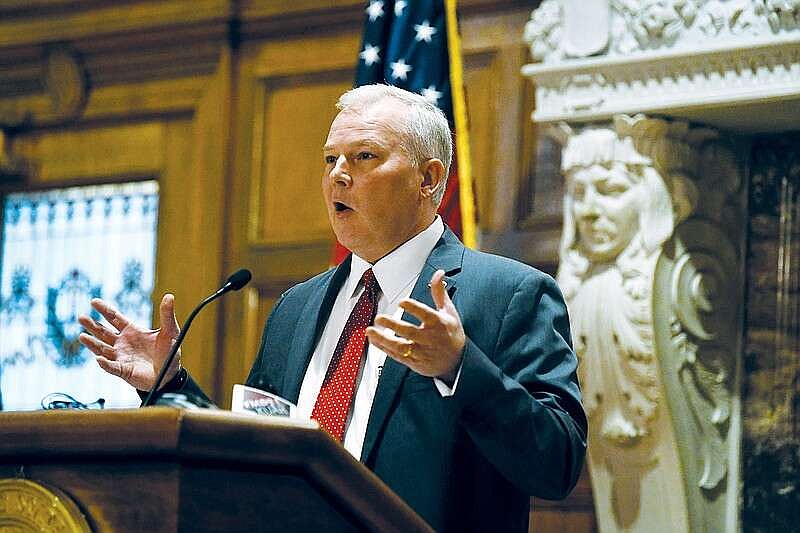Attorney General Tim Griffin accused the state Board of Corrections of violating state law twice at a meeting last week in which it went into executive session and then voted to hire outside counsel.
In a letter sent to the board's chairman, Benny Magness, earlier this week, Griffin stated that the board needs to call a special meeting to "cure these illegal actions" no later than Friday.
Magness and other board members did not respond to requests by the Arkansas Democrat-Gazette for comment, and no announcement of a special meeting had been made late Wednesday.
In his letter, dated Monday and obtained Wednesday by the Democrat-Gazette, Griffin accused the board of violating the open-meetings provisions of the state Freedom of Information Act when it called for an executive session "for an employment issue."
While in executive session Friday, the board discussed the hiring of Little Rock private practice attorney Abtin Mehdizadegan to represent "employment and hiring issues," Department of Corrections spokeswoman Dina Tyler has said. When the board reconvened in public 45 minutes later, it voted 3-2 to hire Mehdizadegan.
"Because it does not involve a public officer or employee, retention of outside counsel does not meet a statutory purpose for the Board to convene in executive session," Griffin wrote in his letter.
Griffin quoted Arkansas Code 25-19-106(c)(1)(A), which states, "an executive session will be permitted only for the purpose of considering employment, appointment, promotion, demotion, disciplining, or resignation of any public officer or employee."
Griffin also stated in his letter that the attempt by the board to retain outside counsel without first referring the matter to his office was another violation of state law.
He quoted Arkansas Code 25-16-702(a), which states that the attorney general "shall be the attorney for all state officials, departments, institutions, and agencies.
"Whenever any officer or department, institution, or agency of the state needs the services of an attorney, the matter shall be certified to the Attorney General for attention," the law states.
The law prohibits the board from "unilaterally hiring outside counsel," and no other section of the law provides the board any "alternative authority" to take such an action, Griffin wrote.
"A Deputy Attorney General from my staff specifically discussed this issue with the Board's compliance attorney after the Board met on Friday," Griffin wrote toward the end of his letter.
Jeff LeMaster, a spokesman for Griffin, declined to provide more details when contacted Wednesday. He said the letter sufficiently explains Griffin's position.
Mehdizadegan, in a phone interview Wednesday evening, said he disagreed with Griffin's "allegations of misconduct" and referred to Arkansas Code 25-16-711, which states that "whenever the Attorney General and a constitutional officer disagree on the interpretation of any constitutional provision, act, rule, or regulation which affects the duties of that constitutional officer, the constitutional officer is authorized to employ special counsel to resolve the disagreement by litigation."
Griffin, along with Gov. Sarah Huckabee Sanders, has also criticized the board recently for failing to fully grant Department of Corrections Secretary Joe Profiri's requests for temporary beds to be opened at state prisons.
At a news conference with Sanders on Nov. 17, Griffin said the board was failing at its job and making the state "less safe" after it agreed to open only 130 of the 622 beds that Profiri had requested earlier that month.
On Friday, the board agreed to add 124 beds at the Barbara Ester Unit in Pine Bluff and renovate an empty metal building at the McPherson Unit in Newport to accommodate 244 beds, but it took no action on a request for the remaining 124 beds Profiri had requested at the Maximum Security Unit in Jefferson County.
A Sanders spokeswoman said after the meeting Friday that Profiri would go ahead and open more bed space at three prisons even without the board's approval because he has the authority to do so.
The board had "plenty of time to do the right thing, but chose not to act," the spokeswoman, Alexa Henning, told the Democrat-Gazette on Tuesday through the spokeswoman.
In a Nov. 20 letter to Sanders and Griffin, Magness said he shared the governor's desire to add more beds, but added that the board is also responsible for making sure the new beds are safe for both jail staff and residents and humane for inmates, while ensuring the processes outlined by the Arkansas Constitution are followed.
He quoted from Arkansas Code 12-27-105, which says the board has "[g]eneral supervisory power and control over the Division of Correction and the Division of Community Correction and shall perform all functions with respect to the management and control of the adult correctional institutions and community correction options of this state contemplated by Arkansas Constitution, Amendment 33."
That amendment, ratified in 1942, prohibits the Legislature and governor from making certain changes to boards or commissions that have responsibility for managing or controlling the state's charitable, penal or correctional institutions and institutions of higher learning. For instance, the amendment says the powers of such boards or commissions can't be transferred to other entities unless the institutions they oversee are consolidated with other institutions or abolished.
